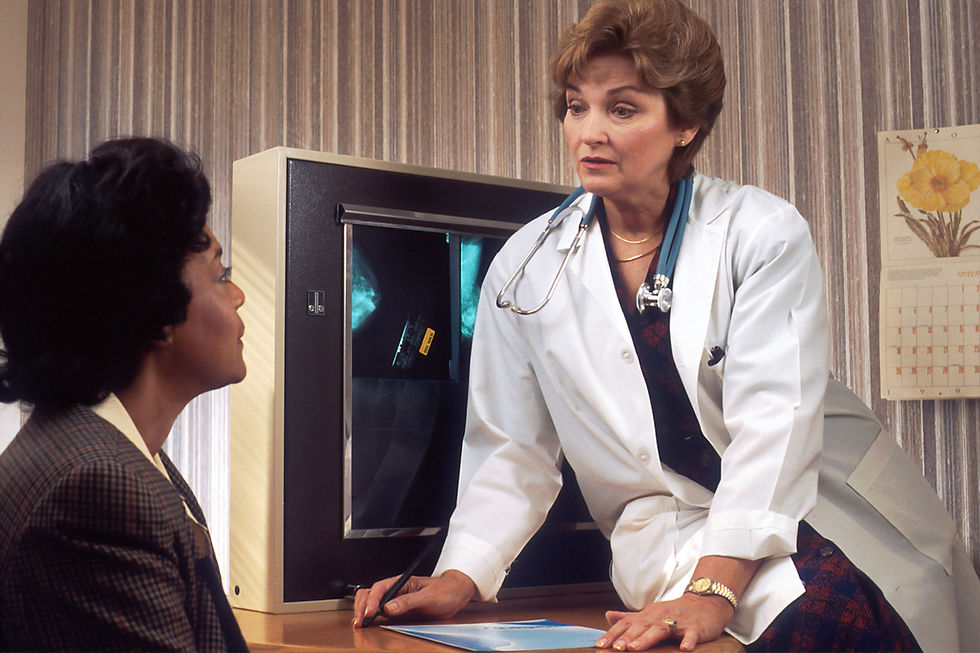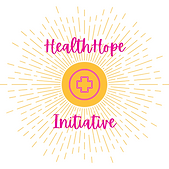Into the Future: AI’s Revolutionary Role in Breast Cancer
- HealthHope Initiative
- Dec 26, 2024
- 4 min read
Writers: Umme Rubab & Gwenyth Reha
Editor: Arisha Siddiqui

Overview
Breast cancer is globally one of the most common cancers, accounting for about 30% of all cancers in women yearly. It is also the second leading cause of death among women from cancer. Approximately 1 in 8 women in the U.S. are estimated to develop this cancer (“What Causes Breast Cancer”). Like other types of cancer, breast cancer may be developed when specific genes are mutated, leading to rapid and uncontrolled cell growth in breasts. Usually, changes in various genes, inherited or acquired, cause breast cancer. Although genetics play a significant role, certain lifestyles are also suspected of being contributing factors for increasing the risk of breast cancer.
Recently, AI has been found to be a revolutionary tool in treating and detecting breast cancer. It is currently being tested in screening and diagnostic procedures to find cancer in its early stages. It has much more precision and efficiency than traditional methods in locating and detecting breast cancer, reducing the workload of radiologists. If AI and machine learning are successfully implemented, they will be more cost-efficient than traditional procedures, making breast cancer detection more accessible. Though these technologies still face numerous obstacles before they are approved for public use, they have the potential to revolutionize breast cancer prevention once they are made available.
Causes and Genetic Risk Factors
Breast cancer may be caused when genes that regulate the growth of cells are mutated (“What Causes Breast Cancer”). In addition, genes that suppress tumors in cells can become mutated as well. With these mutated genes, the cells become cancerous at an exponential rate. There is a wide range of causes for these mutations, either inherited or acquired.
Inherited Risk Factors:
Mutations in tumor suppression genes can be passed down from parent to child. There are several other types of mutations for different vital genes, but this type of mutation is the most common hereditary mutation and is known for causing breast and ovarian cancers. However, genetic testing is a vital aid for comprehensive cancer prevention strategies as it can reveal if an individual has a family history of breast cancer and how likely they are to inherit a gene mutation.
Acquired Risk Factors:
Various lifestyle and health conditions including alcohol consumption, being overweight, lack of physical activity, birth control, menopausal hormone therapy, breast implants, vitamin deficiency, consumption of dangerous chemicals from one’s environment, tobacco smoke, and consistently working late at night can increase risk of genetic mutation. While not related to lifestyle conditions or family history, being born female, aging, and being white also increase risk. In cases that develop under the age of 40, African American women are at higher risk of developing and dying from breast cancer than other races for typically having different physical characteristics such as being taller, having more dense breast tissue, having specific benign breast conditions, beginning menstrual periods earlier, going through menopause later, having radiation near the chest area, and exposure to a type of estrogen medication (“What Causes Breast Cancer”).
AI in Breast Cancer Detection and Treatment
AI is becoming a revolutionary aspect of breast cancer by significantly increasing the accuracy of mammograms. Certain studies with AI-assisted mammograms show improved cancer detection rates by 20%. This increased accuracy and efficiency can significantly help in the early detection and treatment of breast cancer as 20% of breast cancer usually goes undetected by traditional mammography machines. Additionally, the increased efficiency in mammograms through AI would greatly reduce the workload of understaffed and overworked radiologists by 44% (Christensen). Integrating AI into imaging technologies, especially in healthcare, would reduce errors in detection, especially in screenings, thus leading to fewer false diagnoses.
Challenges and Ethical Considerations
Like any other advancement in healthcare, the use of AI would have to face its own challenges before being authorized. Since AI is relatively new to the modern generation, it would require extensive research and regulation before it can be widely used. Data standardization and ethical considerations would also have to be researched by professionals before they can be adopted for use in healthcare treatments. To follow safety protocols, AI would have to be trained using algorithms to validate its accuracy. Ethical guidelines would also have to be addressed in order to ensure data privacy in algorithms. Before AI assistance can be relied on in breast cancer treatments, these challenges must be highlighted and thoroughly researched before making such treatments widely accessible.
High-Risk Management and Preventive Strategies
Even though breast cancer treatment can be very complex and has many complications, there are many treatment methods out there. Treatments include medicines, while preventative measures include surgeries as well as certain lifestyle changes that can significantly reduce breast cancer risks. There are many medication options that regulate certain enzymes and estrogen receptors to significantly lower risk of breast cancer. Like any other medication, it has its own side effects, which is why it is usually only prescribed to high-risk patients with breast cancer. However, if the cancer is recurring, or an individual has a strong family history of breast cancer, surgical options that remove the breasts or ovaries are available as preventative measures (“Breast Cancer”). Many basic lifestyle changes can also reduce the risk of developing breast cancer. These include being physically active, getting a nutritious and high-fiber diet, breastfeeding, quitting smoking, and limiting the consumption of alcohol.
Works Consulted
“Breast Cancer.” Mayo Clinic, www.mayoclinic.org/diseases-conditions/breast-
cancer/symptoms-causes/syc-20352470. Accessed 24 Oct. 2024.
“Can AI and Machine Learning Revolutionize the Mammogram?.” BCRF, 18 Apr. 2024, www.bcrf.org/blog/ai-breast-cancer-detection-screening/
Christensen, Jen. “AI-supported mammogram screening increases breast cancer
detection by 20%, study finds.” CNN Health, 1 Aug. 2023,
“How to Reduce Your Risk of Breast Cancer: 10 Lifestyle Recommendations” Healthline, 6
cancer#stay-active
“What Causes Breast Cancer?” American Cancer Society,
form.html. Updated 19 Nov. 2021.
“Women’s Health” Mayo Clinic, www.mayoclinic.org/healthy-lifestyle/womens-health/in depth/breast-cancer-prevention/art-20044676. Accessed 24 Oct. 2024.




Comments